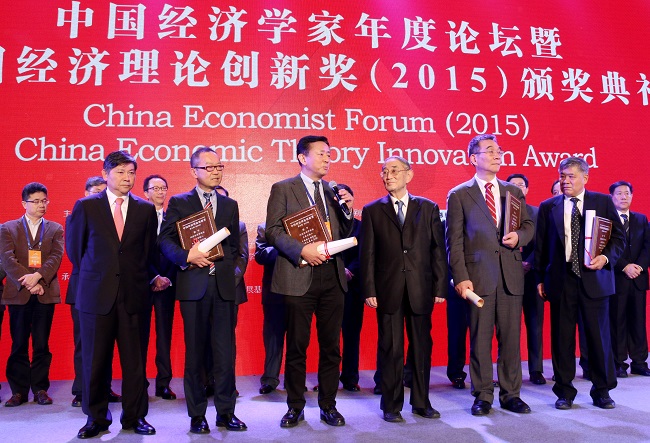 Awardees from left to right: Zhang Jun, Fan Gang, and Lin Yifu
Awardees from left to right: Zhang Jun, Fan Gang, and Lin Yifu
Fan Gang, Peking University HSBC Business School (PHBS)professor and National Economic Research Institute (NERI) director, won the 7th China Economic Theory Innovation Award and was honored at its ceremony in November in Dameisha, Shenzhen. Established in 2008 and conferred every two years, the award is for an original, innovative economic theory, and its purpose is to recognize the awardee’s contributions original economic theory in China. The award is accompanied by a prize of 1 million RMB, outstripping other Chinese economic awards in value, according to Mao Zhenhua, president of the Dong Furen Foundation for Economics and Science Development. Other award winners were Lin Yifu research team (including Lin Yifu, Cai Fang and Li Zhou) and Zhang Jun .
The China Economic Theory Innovation Award was founded by the Dong Furen Foundation along with the following: Peking University School of Economics, Renmin University of China School of Economics, Wuhan University School of Economics and Management, Shanghai Jiaotong University, Antai College of Economics and Management, and Tsinghua University School of Economics and Management. The candidate theories this year were put forward before January 1, 2006.
Fan’s research focuses on macroeconomics, and economics of transition, the later studies an economy which undergoes evolution in the context of a socialist economic institution. It studies conflicts of interest and distribution of revenue arising from reform and how different methods can lower costs.
Fan earned his Ph.D. in economics from the Chinese Academy of Social Sciences and spent two years as a visiting fellow at Harvard University. He is an expert in macroeconomics, institutional economics, and economics of transition. In 1991 and 2005, Fan’s studies in these fields won the Sun Yefang Economic Science Award, acknowledged as the top economic award in China.
Fan also has rich experience in policy consulting. In addition to serving as an advisor to China’s central government and ministries and being engaged in the formulation of economic policies, he serves as a policy consultant to the World Bank, and the Organization for Economic Co-operation and Development (OECD), among others. In 2008, Fan joined PHBS as a full-time professor and doctoral supervisor. During the past few years, he has taught several key courses to MBA, EMBA and graduate students, including macroeconomics, China’s economic issues, economics of transition and development economics.
Fan’s academic career began in late 1980s, when China was transitioning from a planned economy to a market economy. By the time he graduated from Chinese Academy of Social Sciences with a PH.D in economics in 1988, he had gained experience in applying contemporary economic theories and using modern economic tools to analyze Chinese economic issues. Before his graduation with a PH.D, he wrote a paper studying the interest conflicts and behavior distortions among individuals, enterprises, and local and central government under publicly-owned economy, and he analyzed the inevitable loss of social welfare.
But it was his Grey Market Theory, published in the journal Economic Research in 1998, that elevated his stature in the academic community. In that paper, Fan analyzed a unique commercial relation during the process of China’s transformation which, on the one hand, did not follow the rules of the planned economy in terms of allocation or rationing; on the other hand, it violated the principles of a market economy that emphasizes competition. Specifically, it is based on “guanxi” or “back door,” a relationship established through interpersonal connections, which Fan defined as Grey Market relations.
There were shortages and messy rationing at the time during this transitional period, and Fan argued that in order to eliminate the Grey Market, the price quote should be abolished. He said that it is the general economic mechanism reflected in the prices, rather than a price or spread that needed abolishing. Three years later, Fan was conferred with the Sun-Yefang Award for an Outstanding Economic Thesis.
Fan Gang is among the first scholars who delved into the non-Pareto optimal equilibrium during institutional transition. His theory explained that the inevitable hindrance in institutional reforms stemmed from the vested interest from old institutions, and he concluded that the process of reform was to overcome those obstacles and develop new institutions. In 1996, Fan published Political Economics of Progressive Evolution in China, which is the first theoretical work that focuses on institutional transition. Since 2000, he has published several academic works, including On the Dynamic Process of Institutional Transition in China, to argue that developing new institutions is the most important part in the process of institutional transition. Further, he analyzed the significance of balance between various institutional factors and how a particular institutional revolution can affect as well as being affected by other institutions.
In his studies of China’s transition, Fan has put forward multiple theories and concepts based on China’s characteristic reality, including Grey Market, the Soviet Union paradigm, and frictional inflation, etc. In the meantime, Fan selects an institutional variable among a multiple of economic factors and quantifies it. The statistic is named the National Economic Research Institute (NERI) Index of Marketization of China, reported annually by NERI. The report provides a comprehensive comparison in the marketization process among provinces, autonomous regions and municipalities. Similar evaluation systems have been used to enable a continuous measure of marketization process in different regions, thus creating a relatively stable framework for observation of marketization reform. Over the years, time series data on the NERI index are formed, which provides research scholars with powerful tools in analyzing the dynamic process of institutional reform in China.
By Jessie Su
Edited by Young and Jin















